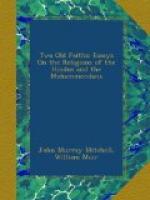[Sidenote: Success in battle ascribed to divine aid.] It is the virtue of Islam that it recognizes a special providence, seeing the hand of God, as in every thing, so pre-eminently also in victory. When Sad, therefore, had established himself in the palace of the Chosroes he was not forgetful to render thanks in a service of praise. One of the princely mansions was turned for the moment into a temple, and there, followed by his troops, he ascribed the victory to the Lord of Hosts. The lesson accompanying the prayers was taken from a Sura (or chapter of the Koran) which speaks of Pharaoh and his riders being overwhelmed in the Red Sea, and contains this passage, held to be peculiarly appropriate to the occasion:
“How many gardens and
fountains did they leave behind,
And fields of
corn, and fair dwelling-places,
And pleasant things which
they enjoyed!
Even thus have
We made another people to inherit the same."[44]
[Sidenote: “Martyrdom” in the field coveted by Moslem crusaders. The Moslem crown of martyrdom.] Such as fell in the conflict were called martyrs; a halo of glory surrounded them, and special joys awaited them even on the battlefield. And so it came to pass that the warriors of Islam had an unearthly longing for the crown of martyrdom. The Caliph Omar was inconsolable at the loss of his brother, Zeid, who fell in the fatal “Garden of Death,” at the battle of Yemama: “Thou art returned home,” he said to his son, Abdallah, “safe and sound, and Zeid is dead. Wherefore wast not thou slain before him? I wish not to see thy face.” “Father,” answered Abdallah, “he asked for the crown of martyrdom, and the Lord granted it. I strove after the same, but it was not given unto me."[45] It was the proud boast of the Saracens in their summons to the craven Greeks and Persians that “they loved death more than their foes loved life.” Familiar with the pictures drawn in the Koran of the beautiful “houries” of Paradise,[46] the Saracens believed that immediate fruition on the field of battle was the martyr’s special prize. We are told of a Moslem soldier, four-score years of age, who, seeing a comrade fall by his side, cried out, “O Paradise! how close art thou beneath the arrow’s point and the falchion’s flash! O Hashim! even now I see heaven opened, and black-eyed maidens all bridally attired, clasping thee in their fond embrace.” And shouting thus the aged warrior, fired again with the ardor of youth, rushed upon the enemy and met the envied fate. For those who survived there was the less ethereal but closer prospect of Persian, Greek, or Coptic women, both maids and matrons, who, on “being taken captive by their right hand,” were forthwith, according to the Koran, without stint of number, at the conqueror’s will and pleasure. These, immediately they were made prisoners, might (according to the example of Mohammed himself at Kheibar) be carried off without further ceremony to the victor’s tent; and in this respect the Saracens certainly were nothing loath to execute upon the heathen the judgment written in their law. So strangely was religious fanaticism fed and fostered in the Moslem camp by incentives irresistible to the Arab—fight and foray, the spoil of war and captive charms.




